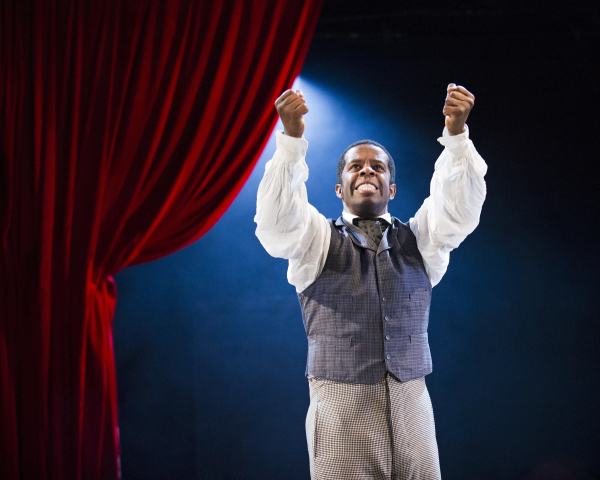Red Velvet

(© Tristram Kenton)
In 1833, American actor Ira Aldridge became the first black man to play Othello at London's Covent Garden. Bizarre as it seems today, the idea of an actual black actor (as opposed to a white actor in blackface) playing a black character was considered radical. This was also a year when the British public was deeply divided over legislation to abolish slavery in the Empire. Lolita Chakrabarti's Red Velvet captures the drama and angst (on stage and off) surrounding Aldridge's groundbreaking performance. Originally produced at London's Tricycle Theatre, Red Velvet is now making its American premiere at St. Ann's Warehouse. It's an endlessly fascinating story that everyone should know.
The play begins in 1867 in Łódź, Poland, the year and place of Aldridge's death. Aldridge (Adrian Lester) is a respected and laureled star of the stage, touring his King Lear throughout Central and Eastern Europe. Halina (Rachel Finnegan) is an enterprising young reporter for The Łódź Times who sneaks into his dressing room looking for an exclusive interview. After icily acceding to her request, Aldridge soon becomes furious when she asks about his performance of Othello at Covent Garden. The rush of emotions sends time spiraling backward.
Flashback to 1833: Theater manager Pierre Laporte (Eugene O'Hare) brings Aldridge into Covent Garden as a replacement for Edmund Kean after the legendary Shakespearean actor collapses and nearly dies during a performance. Laporte's casting choice startles and angers many members of the company, including Kean's son Charles (Oliver Ryan), who assumes he is next in line for the role. Still, other actors like Henry Forrester (Nic Jackman) and Charles' fiancée, Ellen Tree (Charlotte Lucas), are willing to give Aldridge a chance. The question is, will the public?
Both Chakrabarti and Lester (who are married) won Critics' Circle Theatre Awards for the London production of Red Velvet. Clearly London's critics have warmed to Aldridge since 1833, when the reviewer for The Times reported, "Owing to the shape of his lips it is utterly impossible for him to pronounce English in a manner to satisfy even the unfastidious ears of the gallery."
Still, American traveler and former slave William Wells Brown observed about Aldridge's performance of Othello at the Royal Haymarket, "The audience, with one simple impulse, rose to their feet amid the wildest enthusiasm." Suffice it to say, audiences and critics were divided on Aldridge.
Chakrabarti captures this conflict with a painful scene in which the actors sit backstage and read the racially charged screeds of the critics. The civil unrest surrounding abolition subtly bleeds into the theater through these notices and the artful sound design of Paul Arditti.
In a case of life imitating art, these Romantic tragedians act like, well, Romantic tragedians. The acting is big and urgent. One wonders if these players are ever truly offstage. In a performance slightly reminiscent of Julie Andrews, Lucas' Tree is a spunky can-do actress of yesteryear. Ryan, on the other hand, practically seizes with incredulity at the injuries afforded him by the conspiracy of his father and the shifty Frenchman.
O'Hare's French accent is a little Pepé Le Pew, but it happily does not mangle any of Chakrabarti's words. His second-act fight with Lester is among the most dramatically charged and thrilling, with both actors locking horns and snarling like angry bulls. Dagger-tongued accusations that cannot be taken back are hurled with wild abandon, causing you to sit up in your seat and brace for impact.
Lester is awe-inspiring as Aldridge. With flawless diction, he shifts from baseline American to mid-Atlantic to 19th-century African-American. His mastery of American dialects is so precise that one would never guess Lester is actually a British actor. He seamlessly synthesizes 19th-century acting styles (big gestures and grand projection) with our modern-day concepts of "good acting" (realistic emotions) to tell the story of an actor whose style was revolutionary in its day.
While Chakrabarti has a tendency to wander off course (the characters begin to monologue with increasing frequency as the play nears its completion, and there is a subplot about Halina's struggles being the only woman at her newspaper), the subject matter combined with stellar performances in an intelligently directed production makes her digressions more than forgivable. Director Indhu Rubasingham keeps the moments tight and specific, ensuring that our minds never stray from the stage, even as the story does. Imogen Knight has smartly added moments of crystal-clear choreography in the transitions to signify the passage of time and place.
"After years of intent study, I realised his life was too sprawling for me to narrow it down into a single, engaging, dramatic tale," Chakrabarti confesses in her program note. Certainly as a biography, Red Velvet leaves the viewer with too many unanswered questions. As a dramatization of an important moment in theatrical history, however, it more than fits the bill.











